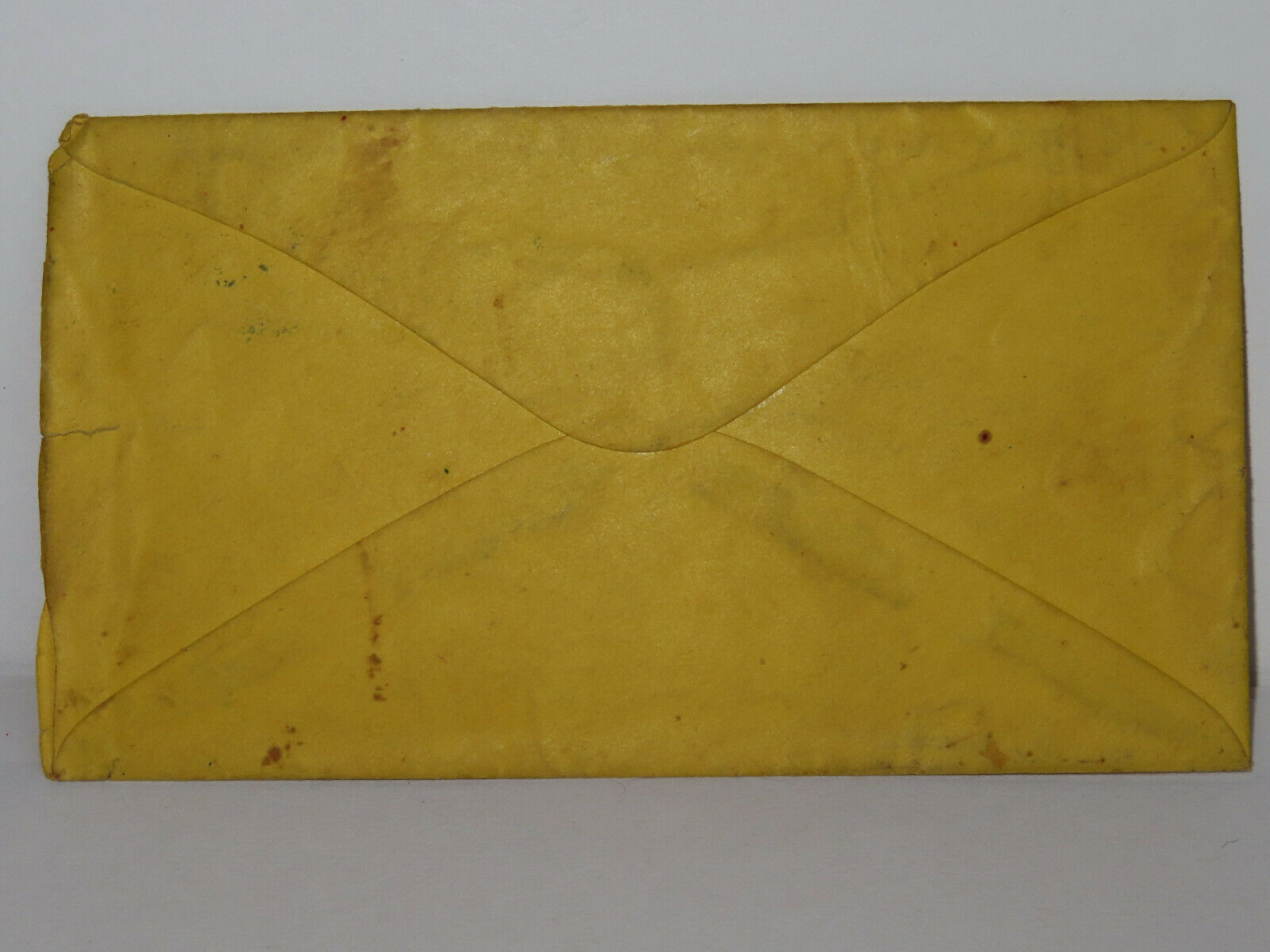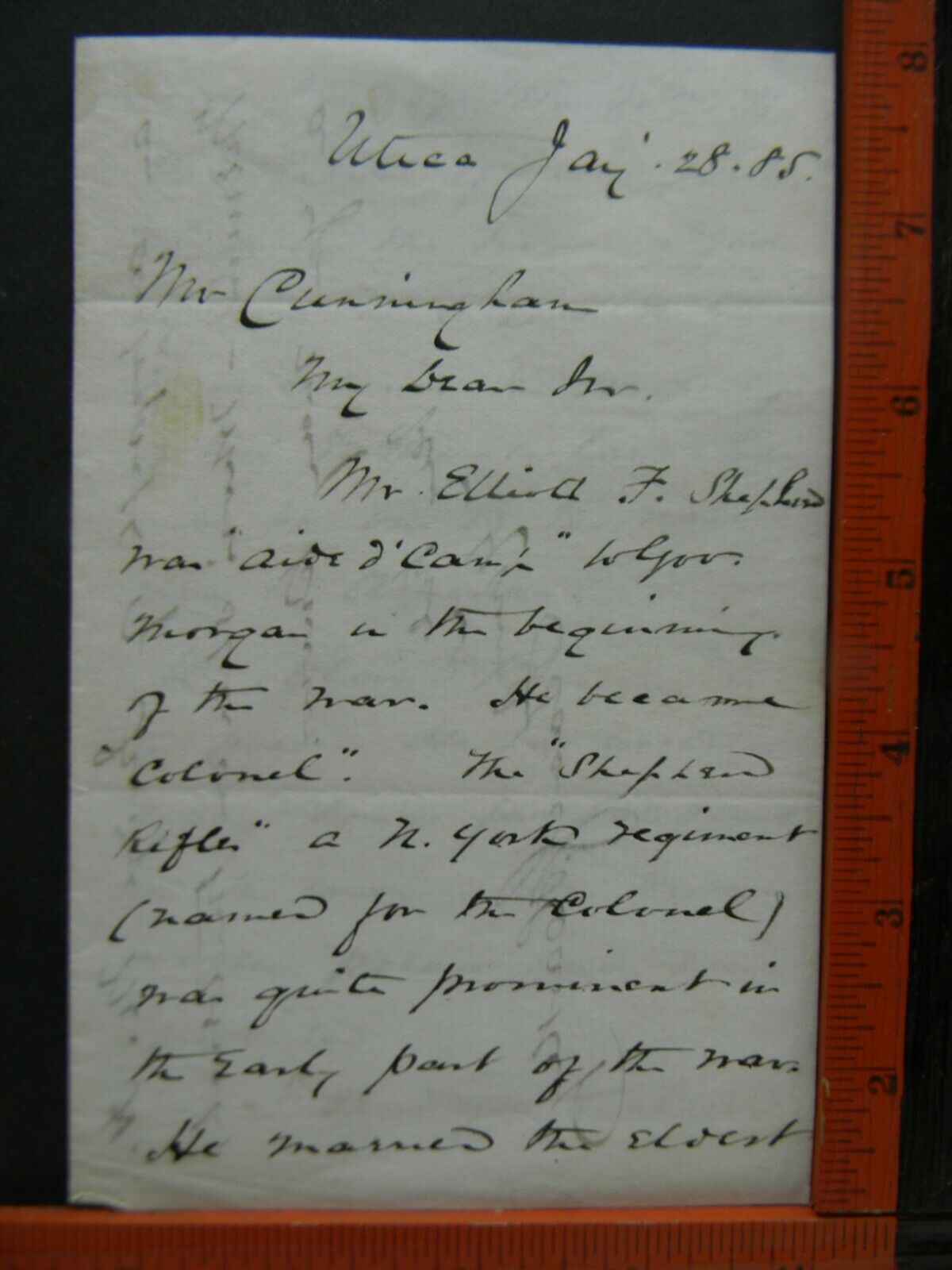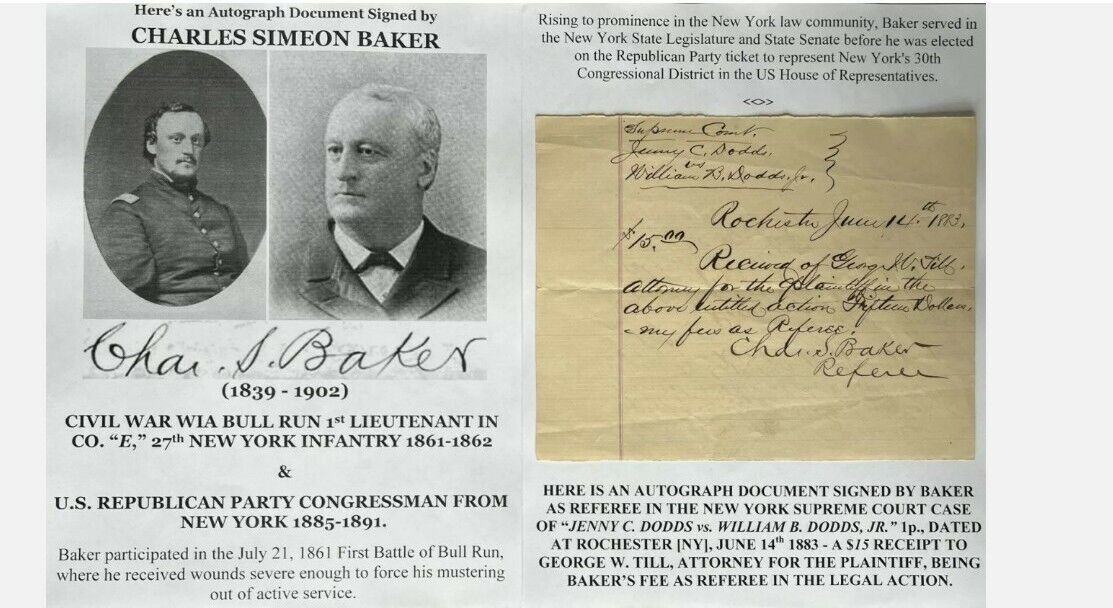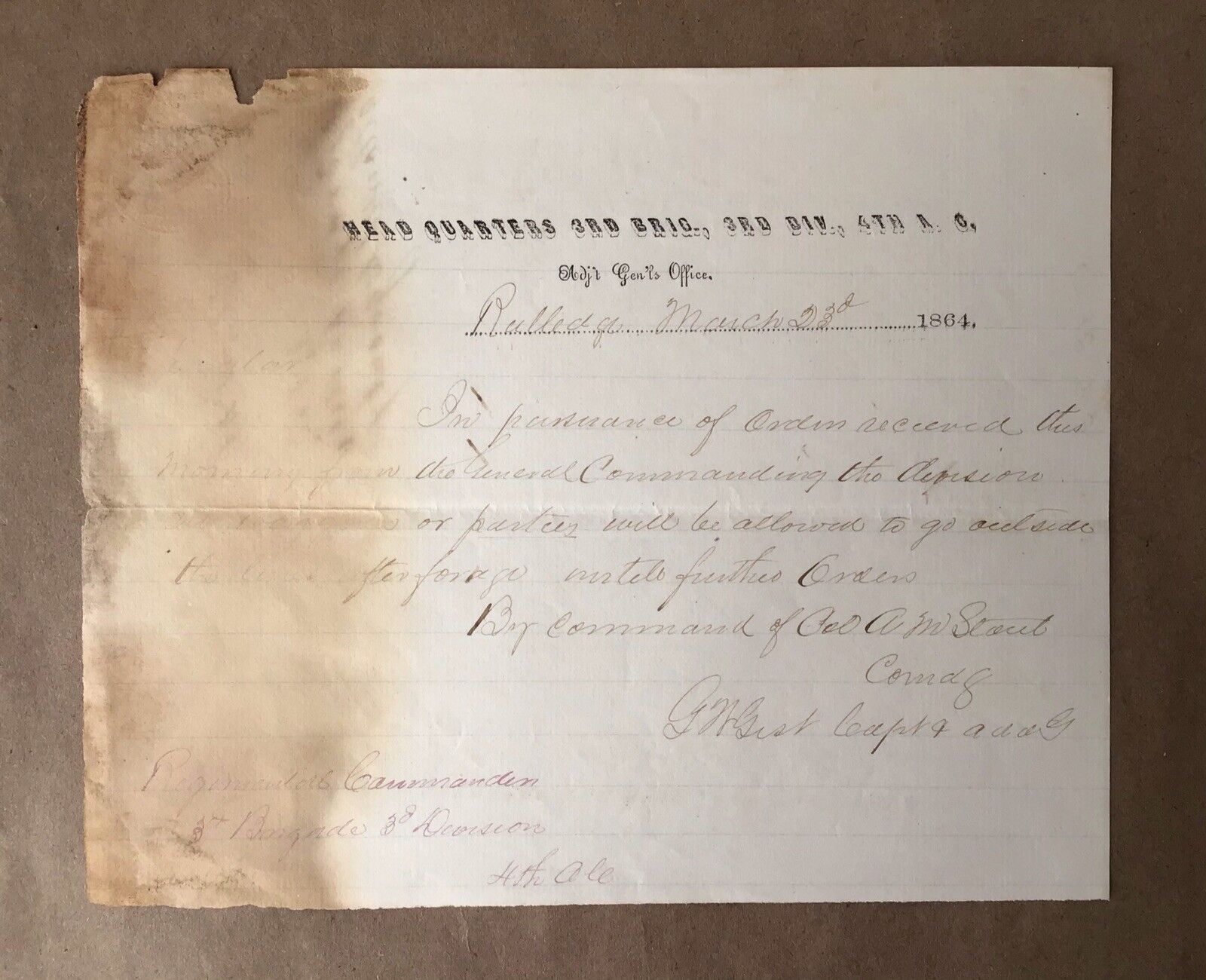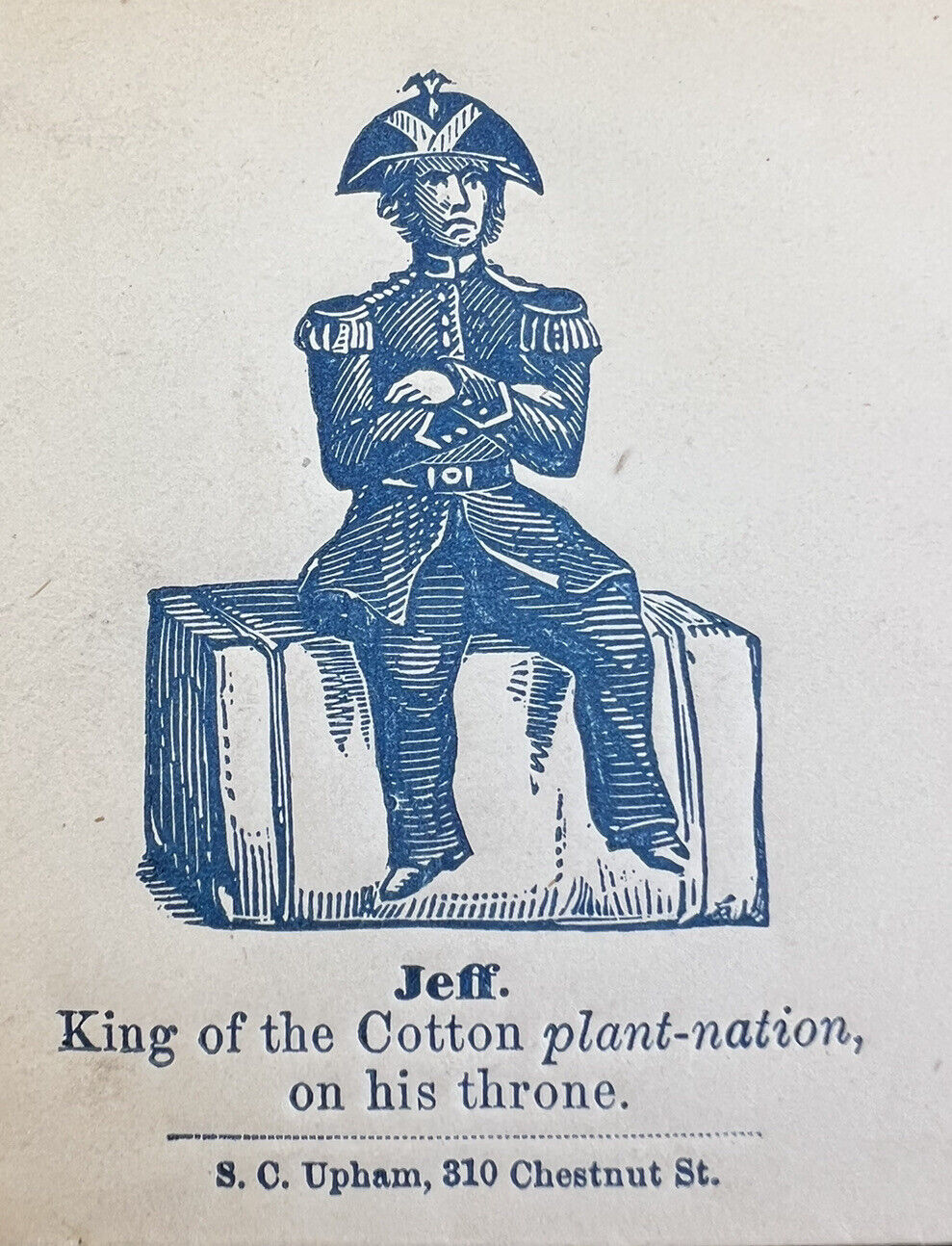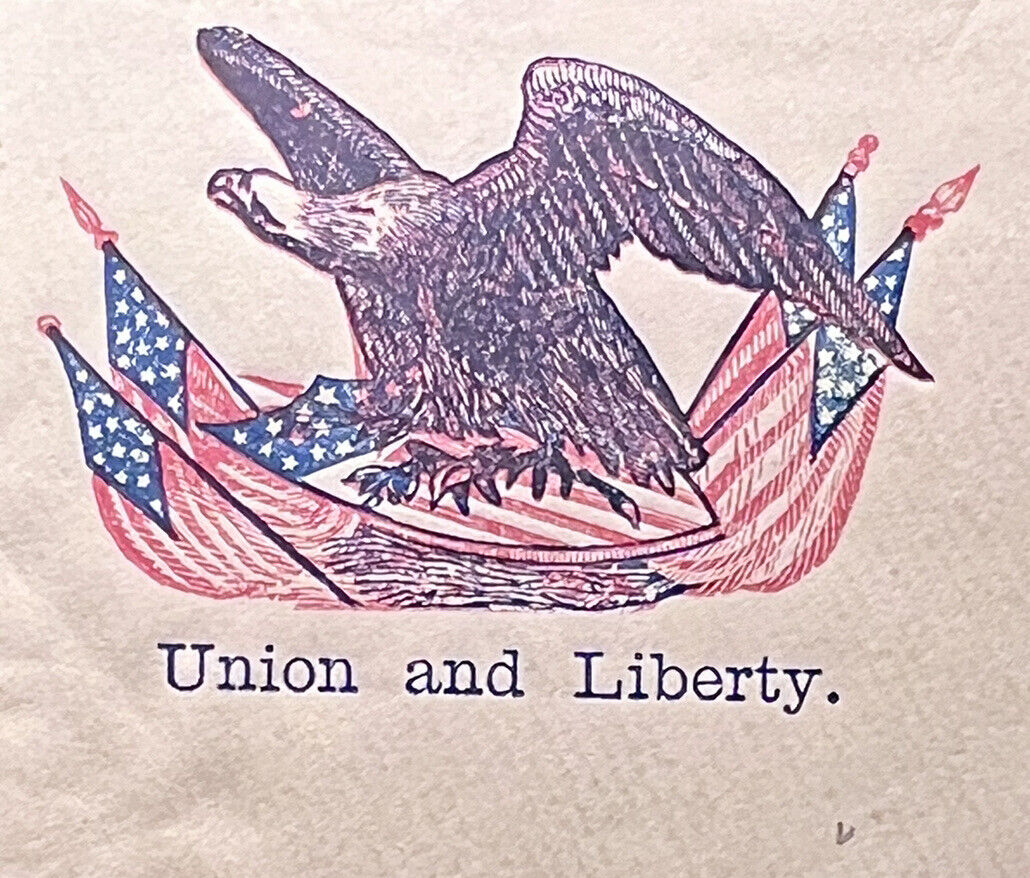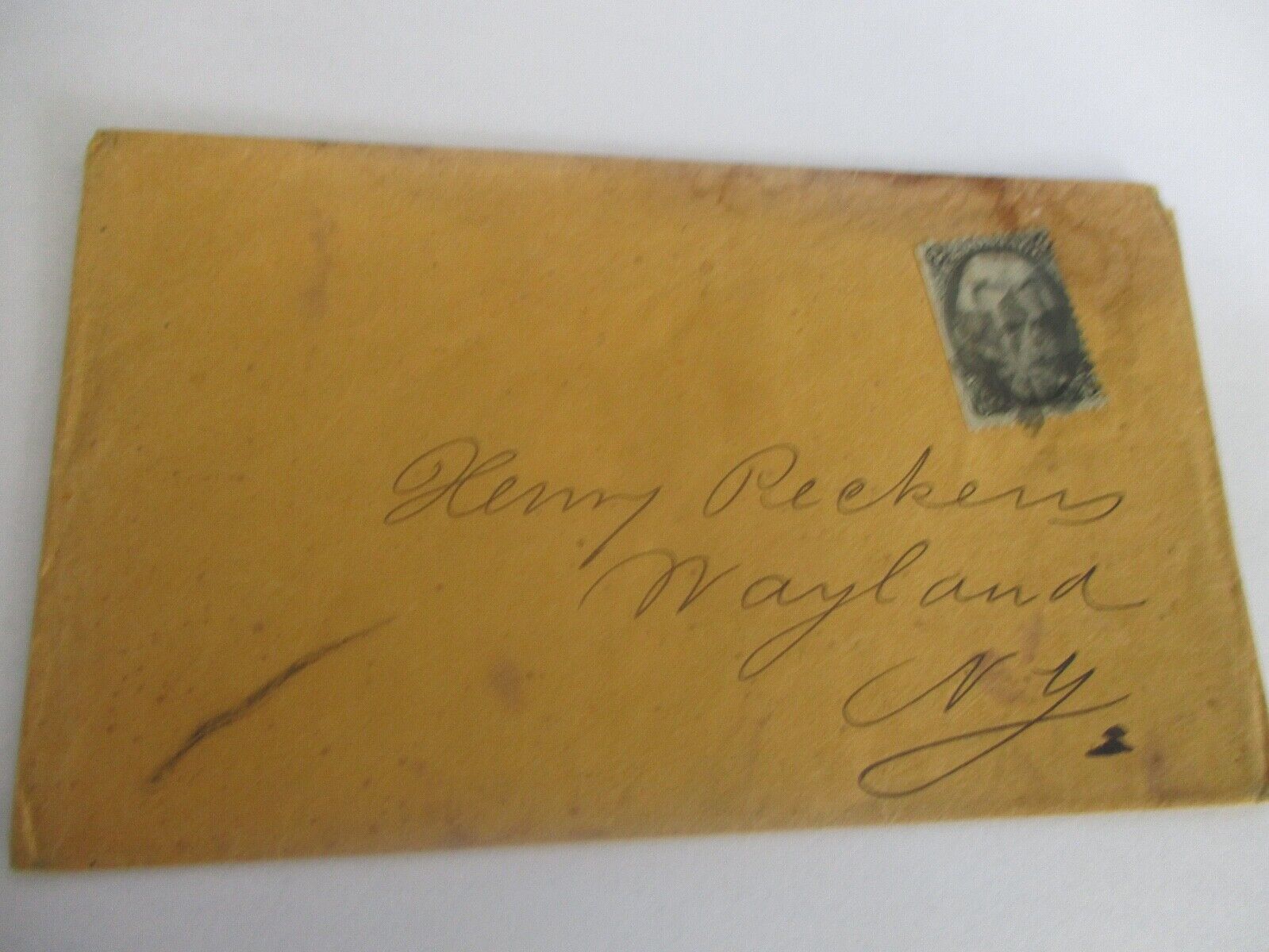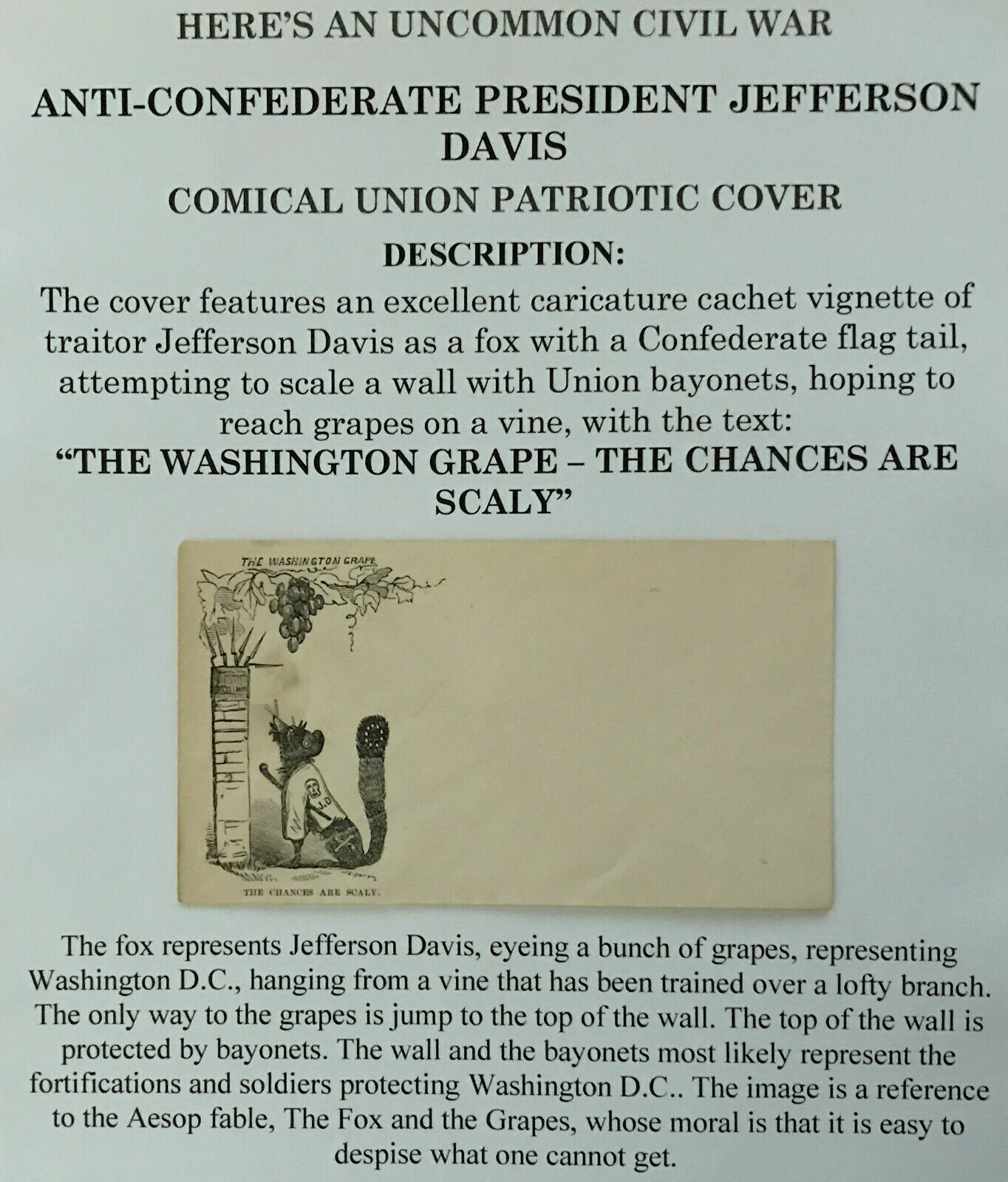-40%
👉Civil War 9TH ILLINOIS INFANTRY Cover HORATIO OSCAR CORNMAN ~ EDWARDSVILLE ILL
$ 15.83
- Description
- Size Guide
Description
Civil War9TH ILLINOIS INFANTRY
Cover
HORATIO OSCAR CORNMAN ~ EDWARDSVILLE ILL
.
Interesting piece
that warrants further research!
INTERNET INFO:
https://sites.rootsweb.com/~mobarry/photos/photo-3/cw.vets.htm
Rashe Cornman: ‘Horatio Cornman’ 1890 Special Veterans Census: Mountain Twp. Comman, Horatio O., Sgt, 9 IL M? Inf, Jenkins
https://sites.rootsweb.com/~mobarry/civilwar/cornmanHoratio.htm
County Died: Barry County, MO
Cemetery: Leann Cemetery, Leann, Barry County, Missouri
Deceased:
CORNMAN, Horatio Oscar "Rasche"
Birth: 23 Oct 1843, Troy, Madison County, IL
Age: 75
Death: Feb. 28, 1918, Barry County, MO
Cause: old age
Married: Amanda Caroline Hudson
Married When & Where: 4-3-1887, Barry County, MO
Father: Ferdinand Cornman, PA
Mother: Elizabeth Jane McKeighan, PA
Military Information: Company B, Illinois 9th Infantry Regiment, sergeant, union
Death Certificate Number:
Resource:
Research Note: https://sites.rootsweb.com/~mobarry/photos/photo-3/cw.vets.htm
Name: Horatio N Cornman Residence: Illinois Enlistment Date: 20 Aug 1862 Rank at enlistment: Private State Served: Illinois Survived the War?: Yes Service Record: Enlisted in Company I, Illinois 9th Infantry Regiment on 20 Aug 1862. Promoted to Full Sergeant on 21 Jul 1864.Mustered out on 21 Jul 1864. Transferred to Company B, Illinois 9th Infantry Regiment on 21 Jul 1864.Mustered out on 28 May 1865. Sources: Illinois: Roster of Officers and Enlisted Men.
https://civilwar.illinoisgenweb.org/history/009.html
9th Illinois Infantry
Regiment History
Adjutant General's Report
On the 26th day of April 1861, the Ninth Illinois Infantry Volunteers was mustered into the service as Springfield for the term of three months. It was one of the six regiments organized under the first call of the President, at the commencement of the war of the rebellion. Six companies -- A, B, C, D, E and F -- were from St. Clair county; G, I and K, from Madison, and H from Montgomery. The regiment was ordered to Cairo, where it was stationed, doing garrison duty until the close of the term of service, July 26th, 1861, when it mustered out. During that time the garrison at Cairo was composed of 8th, 9th, 10th and 12th Infantry. The brigade was composed of these regiments and the 7th and 11th Infantry, the latter being stationed at Bird's Point MO., and the 7th a part of the time at Cairo, and a part of the time at Mound City. The brigade was commanded by General Prentiss. During the three months' service the work of the soldier was made up of fatigue duty, building barracks, clearing off parade grounds, building fort defenses and the redan earthwork where the Ohio river is wedded to the Mississippi, and which guarded the confluence of these rivers from the possible advance of rebel gunboats. The monotonous work of this period was broken only by one incident, a march into the swamps of Missouri, back of Commerce, after Jefferson Thompson. The marching column was composed of battalions from several regiments, including one from the Ninth.
At the expiration of the term of service of the regiment herein named there was no force to take their place as a garrison, which placed Cairo and the vast government stores almost at the mercy of the enemy, but this difficulty was happily overcome by volunteer response from the officers and mend of the disbanded regiments to do garrison duty until their places could be filled by soldier who had enlisted in the three years' service, which was from four to six days. Some two hundred and fifty of this volunteer garrison was composed of the Ninth Infantry, who proposed to re-enlist. In this way the enlistment for the three years' service began with the Ninth. On this mere skeleton of a regiment of officers and men recruiting began in earnest, and in less that thirty days it was again a full regiment. It was organized at Cairo with companies B, C, D and F from St. Clair county; A and I from Madison; H from Montgomery; G from Pulaski; K from Alexander, and E from St. Clair and Mercer.
On the night of September 5th, 1861, General Grant moved with the Ninth and Twelfth Infantry from Cairo to Paducah, taking possession of that city early on the morning of the 6th, thus defeating a similar movement on the part of the rebels only five or six hours. The ninth was ordered to move out and tear up railroad track and destroy a bridge which was about twelve miles out from Paducah. This being accomplished, the regiment returned to Paducah, where it was stationed until early in February 1862. The brigade to which the Ninth belonged was directed to make a feint on Columbus, on the day of the battle at Belmont, which occurred November 7th, 1861. The regiment made several reconnoisances during the time it was stationed at Paducah, but the chief duty was the constant drill and picket duty with the steady demand for fatigue parties for the construction of fortifications, which prepared the soldiers for duty in the field.
On October 15, 1861, about three hundred men of the Ninth moved up the Cumberland river on a steamboat, convoyed by the gunboat "Conestoga," and landed at night a few miles north of Eddyville, Kentucky, and marching out in the night, attacked at sunrise next morning about two hundred rebels at Saratoga, killing and wounding from ten to fifteen and capturing about thirty-six prisoners. In this engagement, the only loss of casualties sustained by the Ninth was in having three wounded. Subsequently the detachment returned to Paducah.
On the 5th of February 1862, all the regiments, save Company H, which was left as provost guard at Paducah, embarked on steamboats to a point five miles below Fort Henry, landing on the left back of the Tennessee river, and moving with the column to attack Fort Heiman, opposite Fort Henry, whilst the latter place was attacked by the gunboats of and First Division. The regiment composed a part of the Second Brigade, Second Division of the Army of the Tennessee in that movement, and was a part of the column that moved on Ford Donelson. The Second Brigade, Second Division, commanded by Colonel John McArthur, was ordered to support the First Division, commanded by General McClernand, on the 13th, and on the night of the 14th was moved to the extreme right of the Union Army; the position of the Ninth being the left of the Brigade the Twelfth was on the right and the Fortieth and Forty-first in the center. The position of the Ninth placed them across the road over which the Confederate forces attempted to break out on the 15th. But eight companies were in position, Company H being left at Paducah and Company A detached as skirmishers to cover the front of a battery. Second Division met the first attack of the enemy. About six hundred men of the eight companies of the Ninth reported for duty, and they sustained a loss of thirty-five killed, one hundred and sixty wounded and six prisoners.
On February 22nd the regiment moved up the Cumberland to Fort Sevier, near Clarksville, and on the 27th marched to Nashville; thence from Nashville, March 1st to Clarksville, and March 6th, embarked for Pittsburg Landing as a part of the Army of the Tennessee. The regiment was at Shiloh, and here again the Second Brigade, Second Division was detached and ordered to the left of General Hurlbutm to fill the gap between the Brigade of Colonel Stuart and the left of General Hurlbut, which was wide enough to require more than a large division to fill. On this part of the line a regiment was engaged until driven back about two o'clock by the enemy, being unable to flank them because of the wide gap to the left. After procuring a new supply of ammunition, the regiment was again engaged until night on the first day of the battle. The regiment went into the field with 578 present for duty, and sustained a loss of sixty-one killed, three hundred wounded and five prisoners, and of those prisoners three were wounded, thus showing a loss of killed and wounded unparalleled by the history of any regiment during the war, which sufficiently attests its gallantry. The regiment took part in the advance on Corinth, and was on garrison duty there, except on occasional reconnaissances, until the second battle of Corinth, October 3rd and 4th, 1862, at which time the Second Division was commanded by General Davis, and the Second Brigade by General R.J. Oglesby. In this battle the regiment sustained a loss of twenty killed, eighty-two wounded and fifty-seven prisoners.
On the 15th of March, 1863, General G.M. Dodge, commanding the left wing Sixteenth Army Corps, which comprised the army then stationed at Corinth, ordered the Ninth to be mounted, and from that time until the expiration of its term of service it remained so, and to write a history of its marches, skirmishes and battles would require more space than that alloted to the history of a regiment in the Adjutant General's Report.
On the 24th of April, the Ninth moved with a cavalry brigade composed of the Tenth Missouri, a battalion of the Fifteenth Illinois and Seventh Kansas under command of Colonel Comyne on a scout in north Alabama, the purpose of which was to make a feint until the expedition of Colonel Streight, who was making a raid around Chattanooga, could pass the cavalry of the enemy. This feint caused the brigade to be engaged in several skirmishes, in one of which one company of the Ninth moving in an exposed position, under an order of the brigade commander, was captured. The loss of the regiment during this expedition was five wounded and fifty-nine prisoners. During this scout the regiment was engaged in five unimportant skirmishes, and was on the march eighteen days. From May 26th to May 31st, 1863, the regiment was engaged as part of the cavalry force on a raid from Corinth to Florence, Alabama, for the purpose of destroying certain factories there. In this raid the Ninth was engaged in several skirmishes. On June 3rd, the regiment was ordered with camp equipage to be stationed at Pocahontas, Tenn. It was our on scout from the 8th of June to the 11th, in western Tennessee, and again from the 12th to the 22nd, in was engaged in a raid through north Mississippi to Ripley, New Albany, Pontotoc and other points; was engaged during this raid in several sharp encounters with the enemy, particularly at Meed Creek Swamps. From the 8th of July to the 15th the regiment was on a continuous scout in west Tennessee, having several skirmishes and sharp encounters at Jackson. From July 20th to August 3rd it was on raid through west Tennessee, without incidents of importance.
On the 3rd of August the ranks of the regiment were increased by the assignment of the 105 deserters, who were sent from Fort Pickering, at Memphis, where they had been help some time as prisoners. These deserters were from many different regiments, and on being assigned to duty made good soldiers. But two if the number again deserted. The fault of their original desertion was evidently not in the men alone, for they were trusted and fully retrieved their character.
On the 6th of August, by reason of an order issued by Major General Hurlbut, commanding the Sixteenth Army Corps, a detachment of the One Hundred and Twenty-eighth Infantry numbering 103 men was consolidated with the Ninth, which further added to the efficient strength of the regiment. These men were assigned to different companies and proved themselves brave men and true, and in many warm conflicts showed themselves good soldiers.
On the 12th of August, the Ninth formed a part of a column of cavalry concentrated at Oxford, Mississippi, and made a raid to Grenade, where was destroyed 60 locomotives, 450 cars, and a large supply of Confederate stores. The regiment returned to camp at Pocahontas, August 24th, having been engaged on a most arduous march and in several slight skirmishes. During the months of September and October the regiment was constantly moving in west Tennessee and north Mississippi, with occasional skirmishes, one at Salem, Mississippi, being a hit fight, and another at Wyatt, Mississippi, was a spirited encounter.
The killed and wounded from the time the regiment was mounted, March 15th 1863, to October 30th, 1863, were as follows: At Jackson, Tenn., 1 killed and 5 wounded; at Cherokee, Alabama, 1 wounded; at Meed Creek Swamps, Mississippi, 2 killed and 10 wounded; at Salem, Mississippi, 1 killed and 3 wounded; at Florence, Alabama, 1 wounded; at Montezuma, Tennessee, 1 killed; at Athens, Alabama, 2 wounded; at Grenada, Mississippi, 1 wounded. Total, 9 killed, 37 wounded.
During the month of November, the regiment was constantly moving and scouting through North Mississippi, north Alabama and central Tennessee, into camp at Decatur, Alabama. From the 1st of November, 1863 to the 1st of May, 1864, the regiment was almost constantly moving, and had frequent engagements, particularly at Moulton, Athens, Florence, and Flint River, in each of which several men were killed and wounded.
Early in May, 1864, the regiment was ordered to take the wagon and ambulance trains of the Fifteenth and Sixteenth Army Corps from Huntsville, Alabama to Chattanooga, Tennessee. When this was accomplished the regiment was ordered to move to the front, and it led the advance of the Army of the Tennessee in the movement to flank Dalton and Buzzards' Roost, Georgia. In getting possession of Snake Creek Gap, a bard, sharp fight ensued, in which several men were lost.
During the Atlanta campaign the regiment was engaged in scouting on the flanks of the army, and this duty was continued
until the close of the term of service of the regiment in July, 1864.
Whilst at Decatur, Alabama, in April, 1864, about 40 of the men re-enlisted as veterans; those with the 105 termed deserters, and the 103 transferred from the One Hundred and Twenty eighth, together with a few recruits, altogether numbering about 150 men, were, by authority of the following order, consolidated:
Special Field Orders.
HEADQUARTERS DEPARTMENT No. 74.
ARMY OF THE TENNESSEE, BEFORE ATLANTA, GEORGIA,
July 21st, 1864.
I. The enlisted men of the Ninth Illinois Infantry whose term of service expires during the present month, with such officers of same as by reason of expiration of term desire to be mustered out of service, will forthwith proceed to Chattanooga, Tennessee, under charge of Colonel Mussy, for purpose of muster-out.
II. The remaining men of the regiment will be consolidated into one or more companies of the legal maximum standard, under the command of Lieutenant Colonel Jesse J. Phillips, and the requisite number of other commissioned officers will be appointed and assigned on the recommendation of Major General G. M. Dodge, commanding left wing Sixteenth Army Corps.
III. Major General G. M. Dodge will order an officer from the battalion thus organized to Nashville, Tennessee, to procure a sufficient number of Spencer rifles to arm the command.
By order of Major General James B. McPherson.
(Signed),
WILLIAM T. CLARK,
Assistant Adjutant General.
Under which order the remaining men were consolidated into a battalion consisting of seven companies. This battalion moved with the army to Savannah; thence to North Carolina, where the Confederate forces surrendered, being constantly on the flank or in advance of the army.
The regiment was mustered out July 9th, 1865, at Louisville, Ky.
SATISFACTION GUARANTEED
We want you to be happy with your purchase.
We offer a 14 day return on any item that you find is not as described. Please give us a chance to make it right if you feel that we have made an error.
Please ask all questions prior to bidding or buying.
We reserve the right to cancel any bids that we think was not made in good faith. By placing a bid or making a purchase from us means that you the buyer agrees to all terms applied on this listing set by Ebay Inc.
We only sell original authentic material.
We are buyers, sellers, and collectors of interesting philatelic & numismatic material. We are life members of the ANA, APS, & CWPS.
"Delivering guaranteed satisfaction on Ebay since 2002.
US SHIPPING
We combine shipping on multiple purchases. Please wait before paying in order to receive a
discount on combined shipping
. We will provide a
tracking number
for your purchase.
WORLDWIDE SHIPPING
We
DO NOT
SHIP OUTSIDE OF THE US
. However, we do use
EBAY GLOBAL SHIPPING
whereby Ebay charges you a fee to guarantee a safe and timely delivery of your package. Please contact Ebay for your country's rate.
All fees collected from Ebay's global shipping goes to Ebay, Inc. not the seller.
PAYMENT
WE GLADLY ACCEPT PAYPAL
as as well as other forms of payments set by Ebay's managed payments.
Please pay for your purchase within
3
days
. Ebay will automatically send payment reminders; so please disregard if payment has already been made.
Any and all state taxes collected from Ebay via your invoice goes to your state tax office not the seller.
Please contact Ebay with any local and state tax questions before bidding/buying.

